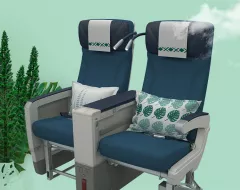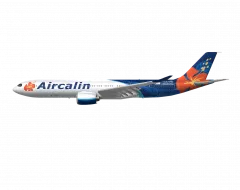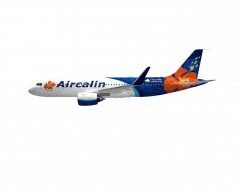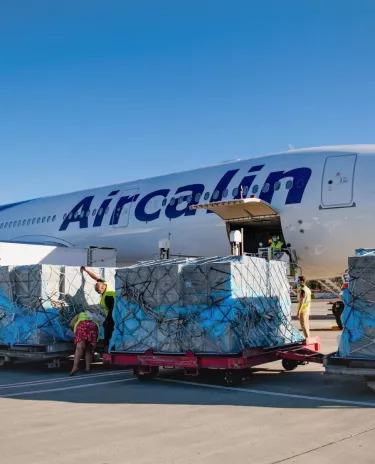The service
We offer you a range of different products-services:
| Routine | Standard or grouped freight, Post Standard delivery |
|---|---|
| Priority | Special freight Express delivery |
| Dedicate | Exceptional freight Tailored delivery |
These products find their complementarily in our partnerships developed with major airways companies such as Qantas, Air New Zealand and Air France-KLM.
The conditions
Plane type | Door dimensions (lxh) | Max. weight per container |
|---|---|---|
| A320 | 1.82m x 1.24m | 1 049 kg |
| A330 | 2.24m x 1.60m | 4 506 kg |
Information
Each sending must be delivered "ready to carry”, accompanied by the following documents:
- an “air transport letter” or LTA ;
- a Sender’s Instruction Form (or BIE) and/or a parcel list ;
- the customs declaration ;
- any other document requested by AIRCALIN at the time of booking
Eventually, depending on the kind of expedition, other documents may be requested:
- health and phytosanitary certificate ;
- dangerous goods report (or DGR) ;
- live animals report (or LAR) ;
- Contents report for personal belongings expedition.
These documents must be completed and /or controlled by the sender.
Labeling of the expedition
The parcel (s) composing the expedition must absolutely bear the name and full address of the sender – such as they appear on the LTA.
Besides, a labelling provided by AIRCALIN shall be systematically compulsory, particularly for expeditions of special nature (perishable, dangerous, live animals, etc.)
Packing
The contents of the expedition must be packed in such a way that the package is able to resist all normal aerial conditions (vibrations, pressure) due to transportation. Dangerous goods must be conditioned according to applicable regulations.
The sender must declare the fragility of some parcels on the BIE.
Contacts
Aircalin
Tontouta office
Tontouta airport – Freight terminal
Opening hours Monday to Friday: 7:30 – 11:00 / 11:45 – 16:00
Phone: 35 15 30
Fax: 35 19 01
Email: fret@aircalin.nc
To book your shipment
Please contact a forwarder for all shipments. You can find a list of available forwarders here.
For pre-embarkation of your expedition
PACIFIC AIRPORT ENGIE
Freight area – Tontouta airport
Phone: 35 26 13
Email: fret.operations@pacific-airport.engie.com
For pre-embarkation of your expedition
For any sending of perishable goods, animals or plants
SIVAP: Veterinary Food and Phytosanitary Inspection Service
City centre, 2 rue Felix Russell, Noumea
Phone: 35 11 94 or 24 37 45
Email: sivap.davar@gouv.nc
For any information concerning customs formalities
Customs: Tontouta Customs Office Freight terminal
Tontouta Airport
Phone: 35 11 64
General conditions of sale and transport of goods
Article 1: Definitions
The AGENT means, unless the context otherwise requires, any person or company who has the authority, express or implied, to act for or on behalf of the Carrier in the carriage of goods, unless such person is acting as the shipper as part of a shipment governed by these general conditions of carriage.
AIR WAYBILL means the document entitled “Air Waybill” issued by or on behalf of the shipper, which formalizes the contract between the shipper and the carrier for the carriage of goods on the carrier's routes and which incorporates these general conditions of carriage. The format of the air waybill must comply with the air waybill specifications set out in IATA Resolution 600a.
APPLICABLE CONVENTION means, unless the context otherwise requires, which of the following instruments is applicable to the contract of carriage: the Montreal Convention, which is applicable if the country of origin and the country of destination apply this text. Otherwise, the Warsaw Convention applies.
FREIGHT (which is equivalent to the word “Goods”) means anything carried or to be carried on an aircraft, with the exception of baggage carried under a passenger’s ticket and baggage’s’ check, but includes baggage carried under an air waybill or shipping document. Animals carried under an air waybill or shipping document are considered as “goods” for the purposes of this definition.
TRANSPORTATION means the carriage of goods by air or by any other means of transport, whether free of charge or against payment, within the meaning of the applicable convention.
CARRIER means the air cargo carrier indicated on the air waybill or shipping document and includes the air carrier issuing the air waybill or retaining the shipping document and all carriers which carry or undertake to carry the goods or to provide another service associated with such carriage and whose code appears on the air waybill or shipping document.
PREPAID refers to the charges shown on the air waybill or the shipping file and paid by the shipper.
A CODE-SHARED FLIGHT refers to a flight operated by an air carrier, which may be either the carrier with which the agent has concluded a contract (contracting carrier or contract carrier), or another carrier (carrier operating the flight or operating carrier) to which the contracting carrier has associate its designation code.
The CONSIGNEE means the person or company whose name or designation appears on the air waybill or shipping document, as the party to whom the cargo is to be delivered by the carrier, subject to other instructions.
CARRIAGE CONTRACT means the oral or written agreement between the shipper and the carrier relating to the carriage to be performed by the carrier, including freight rates.
DAYS means clear days, including Sundays and public holidays, it being understood that, for the purposes of notification, the day on which the notice is sent is not counted.
CARGO (which is equivalent to the word “shipment”). Except as otherwise provided herein, one or more packages, pieces or bundles of goods accepted by the carrier from one shipper, at a given time and address, and for which the receipt is made out in a single consignment and under a single air waybill or shipping document, for carriage to a single consignee at a single destination address.
SHIPPING DOCUMENT means any contract of carriage document retained by the carrier, proven by means other than an air waybill.
SHIPPER means the person named on the air waybill or shipping document as a party to the contract of carriage of goods with the carrier.
The SPECIAL DRAWING RIGHT as defined by the International Monetary Fund (IMF), whose value is determined periodically by the latter, based on the value of several reference currencies.
(In April 2025, the rate is 26 SDR per gross kilogram).
Article 2: Carriage of goods: applicable law
2.1 Any carriage performed by the carrier, either itself or through third parties, including all related services performed by itself or such third party, are:
a) the applicable convention, as it applies to the carriage.
b) other national and international laws in so far as they are applicable to the transport,
c) any other national or international government regulations, orders or requirements, in so far as they apply to the carriage,
d) these general conditions of carriage and other conditions, rules, regulations and flight schedules determined by the carrier (excluding arrival and departure times indicated therein).
2.2 For the purposes of the applicable agreement, the agreed places of call, which may if necessary be modified by the carrier, are the places - except for the point of departure and the point of destination - indicated on the air waybill or scheduled as regular places of call for the air route in the carrier's flight schedules.
Article 3: Applicability
3.1 GENERAL TERMS AND CONDITIONS
These conditions apply to any carriage of goods, including all related services, performed by or on behalf of the carrier; it being understood, however, that if such carriage is “international carriage” as defined in the applicable convention, such carriage shall be subject to the provisions of the applicable convention and to these general conditions of carriage in so far as the latter are not incompatible with the provisions of the said convention.
3.2 CODE-SHARE FLIGHTS
Certain flights or services of the air carrier may be subject to a code-share agreement with other air carriers. In this case, a carrier whose designation code does not appear on the air waybill may operate the air service concerned. The present general conditions of carriage remain applicable to this type of flight.
3.3 FREE OF CHARGE TRANSPORTATION
In the case of free of charge transportation, the carrier reserves the right to exclude the application of all or part of these general conditions of carriage.
3.4 CHARTER
Carriage of goods performed under a lease or charter contract will be subject to the carrier's specific charter rules and these conditions will apply to the extent permitted by said charter rules. Where the carrier has no charter rules applicable to such charter contract, these conditions shall apply to such contract, but the carrier reserves the right to exclude the application of all or any part thereof and, in the event of any discrepancy between the provisions of these conditions and the conditions contained in the charter contract, whether or not concluded with the shipper, agrees to be bound by such charter contract.
3.5 MODIFICATION WITHOUT NOTICE
These general conditions of carriage, as well as published rates and royalties, are subject to change without notice, unless otherwise specified by applicable law or government regulations or orders; it being understood that no change shall apply to any carriage’s contract after the date of issue of the air waybill by the carrier or after the date on which the rate or charge for carriage has been entered in the shipping document.
3.6 APPLICABLE RULES
Any carriage of goods governed by these general conditions of carriage shall be subject to the carrier's rules, regulations and tariffs in force on the date of issue of the air waybill by the carrier or on the date of the shipping document, depending on the case, it being understood that in the event of any inconsistency between these general conditions of carriage and the carrier's rules, regulations and tariffs, these general conditions of carriage shall prevail. Any provision here of which is or may be invalid or not applicable shall, to the extent of such invalidity or unenforceability, be deemed severable and shall not affect the remaining provisions hereof.
Article 4: Acceptability of goods for transport
4.1 ACCEPTABLE CARGO
4.1.1 Carrier agrees to carry, subject to the availability of suitable equipment and capacity, all shipments, unless otherwise excluded by Carrier's regulations and provided that:
4.1.1.1 the carriage, export or import of those shipments is not prohibited by the laws or regulations of any country from, to or over which they are carried.
4.1.1.2 they are packed in such a way that they can be transported by air.
4.1.1.3 they are accompanied by the required shipping documents.
4.1.1.4 they are not likely to endanger the aircraft, persons or property, or cause inconvenience to passengers.
4.1.2 The carrier reserves the right, without assuming any liability whatsoever, to refuse carriage of goods or to detain, cancel, defer or, at any time, return any cargo likely to cause damage or delay to other cargo, goods or persons, or the carriage of which is prohibited by law or constitutes a breach of any of these general conditions of carriage. Carrier's acceptance of any cargo does not imply compliance with applicable laws and regulations or with these general conditions of carriage.
4.2 CARGO VALUE AND ASSESSMENT LIMITS
The carrier may refuse to carry any shipment with a declared value for carriage exceeding the limits of liability set out in the applicable convention. The air waybill must state “No Value Declared” or “NVD” in the “Declared Value for Carriage” field.
4.3 PACKAGING AND MARKING OF GOODS
4.3.1 The shipper is responsible for ensuring that the cargo is suitably packaged for transport to guarantee its safe carriage with ordinary care during handling and in such a way as not to injure or damage persons, goods or property. Each package must be legibly and durably marked with the full name and address of the sender and consignee.
4.3.2 Packages containing valuables as defined in the carrier's regulations must be sealed if requested by the carrier.
4.4 GOODS ACCEPTABLE ONLY UNDER PRESCRIBED CONDITIONS
Dangerous goods, live animals, perishable goods, fragile goods, human remains, and other special goods are acceptable only under the conditions set out in the carrier's regulations applicable to the carriage of such goods.
4.4.1 Perishable goods: The carrier will not be liable for any direct, indirect or consecutive, loss and/or claims arising from any alteration in quantity or quality, depreciation or deterioration which may be caused to perishable goods by temperature or humidity conditions or by delays in the flight schedule. According to article 7.2 of the IATA regulations on perishable goods, air waybills must under no circumstances contain unreasonable instructions and/or specific temperature conditions, such as “Keep cool at all times” or “Always”. Acceptable wording could be “Whenever possible” or “Wherever possible”.
4.4.2 Dangerous goods: The shipper who has received and passed the relevant training must not book any cargo for carriage which is or maybe come dangerous, volatile, explosive, flammable or offensive or which is or may be likely to damage any property or present a risk to the environment what so ever, without presenting a full description revealing the nature of such cargo. In any event, the shipper will be liable for any loss and damage caused. If, in the sole opinion of the carrier, the cargo becomes or is likely to become dangerous, inflammable, explosive, volatile, offensive or damaging in nature or likely to present a risk to the environment, it may at any time be detained, destroyed, disposed of, abandoned or rendered harmless by the carrier without compensation to the shipper and without prejudice to the carrier's right to any charges and at the shipper's expense.
4.4.3 Live animals: The shipper is responsible for all administrative formalities required by the country of origin and/or transit and/or destination of his animal(s) traveling as freight. The carrier cannot be held responsible for any failure to comply with the health authorities. Please note that on Aircalin flights:
a) Pitt Bull dogs are not accepted.
b) Dogs & cats over 10 years of age are accepted for carriage on Aircalin flights only on presentation of a signed veterinary certificate confirming that the animal's state of health permits carriage by air in optimum conditions.
c) Brachycephalic animals are accepted for carriage on Aircalin flights only on presentation of a veterinarian's certificate of good health, the use of a cage larger than the size required by current regulations, and a waiver of responsibility signed by the animal's owner.
4.5 LIABILITY FOR NON-COMPLIANCE OF THE CONDITIONS RELATED TO SPECIAL CARGO
Responsibility for non-compliance with the conditions relating to the carriage of goods lies with the shipper, who shall indemnify the carrier against any loss, damage, delay, liability or penalty which the latter may incur as a result of the carriage of such goods.
4.6 CARRIER'S RIGHT OF INSPECTION
The carrier reserves the right to examine the packing and contents of all cargoes and to inquire into the accuracy or completeness of any information or documents submitted in respect of any cargo, but the carrier is under no obligation to do so.
4.7 UNIT LOAD DEVICES
When the shipper undertakes to load a unit load device (ULD), he must comply with the carrier's loading instructions and will be responsible for and indemnify the carrier against all consequences of non-compliance with these instructions.
Article 5: Documents
5.1 AIR WAYBILL
The consignor shall prepare or cause to be prepared on his behalf an air waybill in the form, manner and number of copies prescribed by the carrier, and shall deliver such air waybill to the carrier simultaneously with the carrier's acceptance of the cargo for transportation. However, freight and other charges, to the extent determined, will be inserted in the air waybill by the carrier. The carrier may request the shipper to issue, or have issued on his behalf, separate air waybills when there is more than one package.
5.2 ELECTRONIC AIR WAYBILL
Shippers whose membership of the Customer Portal has been validated, undertake to draw up and/or keep in electronic form and signed by an electronic signature in accordance with the applicable regulations (e-AWB) and commit themselves to an exclusively e-AWB process. Shippers must issue or have issued on their behalf the electronic Air Waybill prior to the Carrier's Carriage Conformity Check (“FOH” - “freight in hand”), which will be considered as the legally binding Air Waybill. The information on the e-AWB replaces any paper AWB presented for acceptance, and constitutes the main information for the Carrier's documentation, acceptance and invoicing.
If there are imperative legal and/or regulatory reasons requiring the use of a paper Air Waybill and this cannot be processed by the above means, the Shipper shall be responsible for issuing it to enable the Shipment to be carried and shall in form the Carrier in writing as soon as possible and in any event before presenting the Shipment for Carriage.
5.3 SHIPPING DOCUMENT
The carrier, with the express or implied consent of the shipper, may substitute a shipping document for an air waybill to keep a record of the carriage to be performed. If such a document is used, the carrier must, at the shipper's request, issue to the latter, in accordance with the carrier's regulations, a cargo receipt for the shipment enabling identification of the shipment and access, in accordance with the carrier's regulations, to the information contained in the shipping document.
5.4 VISIBLE CONDITION/PACKAGING OF GOODS
If the apparent order and condition and/or packaging of the goods is in any way defective, the shipper must, if an air waybill is issued, include on the air waybill a statement concerning such apparent order and condition. If no air waybill is issued, the consignor must inform the carrier of the apparent condition of the goods, to enable the carrier to insert an appropriate reference there to in the shipping document.
However, if the shipper fails to include such statement in the air waybill or to advise the carrier of the apparent order and condition of the goods, or if such statement or advice is incorrect, the carrier may include in the air waybill or insert in the shipping document a statement of the apparent order and condition of the goods, or make a correction there to.
5.5 PREPARATION, COMPLETION OR CORRECTION BY THE CARRIER
The carrier may, at the express or implied request of the shipper, prepare the air waybill, in which case, in the absence of proof to the contrary, the carrier is deemed to have done so on behalf of the shipper. If the air waybill delivered with the goods or if the particulars and declarations relating thereto furnished by or on behalf of the shipper to the carrier for insertion in the shipping document do not contain all the particulars required, or if the air waybill or such particulars or declaration contain any error whatsoever, the carrier is authorized to complete or correct the air waybill or the particulars or declarations to the best of is ability without being bound to do so.
5.6 RESPONSIBILITY FOR DATA
The shipper is responsible for the accuracy of the cargo data and declaration inserted by him or on his behalf in the air waybill or supplied by him or on his behalf to the carrier for insertion in the shipping document. Where such information is supplied by Electronic Data Interchange (EDI), it is the responsibility of the shipper or his agent to verify the content, accuracy and completeness of EDI messages and subsequent messages in accordance with agreed standards and specifications. The shipper will indemnify the carrier against any damage suffered by him, or by any other person to whom the carrier is liable, as a result of the irregularity, inaccuracy or incompleteness of the particulars and declaration supplied by the shipper or on his behalf.
5.7 ALTERATION
The carrier has the right to refuse air waybills whose handwriting has been altered or erased.
Article 6: Rates and Charges
6.1 APPLICABLE RATES AND CHARGES
The rates and charges (including terminal charges) applicable to the carriage governed by these General Conditions of Carriage are those duly published by the Carrier from time to time, or determined by the Carrier in accordance with applicable laws and regulations and in effect on the date of issuance of the air waybill by the Carrier or on the date on which the rate or charge for carriage was entered in the shipping document.
6.2 FARES AND CHARGES REFERENCE
Rates and charges will be based on units of measure and subject to the rules and conditions published in the carrier's regulations and tariffs.
6.3 SERVICES NOT INCLUDED IN PUBLISHED FARES AND CHARGES
Unless otherwise specified in the carrier's product and service regulations, rates and charges apply only on an airport-to-airport basis and do not include ancillary services provided by the carrier in connection with air transportation, in particular surface transportation services between airports or between airports and designated pick-up or delivery addresses.
In addition, unless expressly provided otherwise in published tariffs, freight rates and charges do not cover the following services (without this list being limitative):
a) pick-up and delivery services to and from the airports from which the carrier performs its services,
b) storage charges,
c) insurance costs,
d) advanced charges,
e) costs incurred by the carrier in clearing cargo through customs, or incurred by third parties, whether acting as agents of the shipper, consignee, cargo owner or carrier,
f) charges or fines imposed or levied by competent authorities, including duties or taxes,
g) costs incurred by the carrier in repairing defective packaging,
h) transport costs for the carriage, reloading or return carriage of the goods by other means of transport, as well as transport costs for the return carriage to the place of departure,
i) surcharges,
j) any other similar services or charges.
6.4 PAYMENT OF CHARGES
6.4.1 Published fares and charges may be paid in any currency acceptable to the carrier. When payment is made in a currency other than that in which the fare or charge is published, such payment will be made at the rate of exchange established for such purpose by the carrier, a current statement of which is available for inspection at the carrier's office where payment is made.
6.4.2 All applicable prepaid fees, duties, taxes, charges, advances and payments, made, incurred or to be incurred by the carrier and all other sums payable to the carrier, will be considered as fully acquired, whether or not the goods are lost or damaged, or do not arrive at the destination specified in the transport contract.
6.4.3 Shipper guarantees payment of all unpaid charges, uncollected charges, advances and disbursements of carrier. Shipper also guarantees payment of all costs, expenses, fines, penalties, loss of time, damages and other sums which carrier may incur or suffer by reason of the inclusion in the shipment of articles the carriage of which is prohibited by law, or the marking, numbering, the illegal, incorrect or inadequate marking, numbering, addressing or packaging of packages or description of goods, or the absence, delay or inaccuracy of any export or import license or certificate or document required, or any incorrect customs valuation, or any incorrect declaration of weight or volume.
6.4.4 If the cargo's gross weight, tare, quantity or declared value exceeds the gross weight, tare, quantity or declared value on which the freight charges were previously calculated, the carrier shall be entitled to demand payment of the charges on this excess.
6.4.5 The carrier may cancel the carriage of the cargo in the event of the shipper's refusal to pay all or part of the required charges, after the carrier's payment has been made, without the carrier's liability being incurred in this respect.
Article 7: Cargo during transport
7.1 COMPLIANCE WITH GOVERNMENTAL REQUIREMENTS
7.1.1 The shipper shall comply with all laws, customs duties and other governmental regulations applicable in any country to or from which the goods may be transported, including those relating to the packaging, carriage or delivery of the goods, and shall, together with the cargo, furnish such information and issue such documents as may be necessary to comply with such laws and regulations.
The Carrier shall not be liable to the Shipper or any other person for any loss or expense arising from the Shipper's failure to comply with this provision.
The shipper shall be liable to the carrier for any damage caused by the shipper's failure to comply with this provision.
7.1.2 The Carrier shall not be liable for any refusal to carry a shipment if the Carrier reasonably and in good faith determines that such refusal is required by any applicable law, governmental regulation, request, order or requirement.
7.2 DISBURSEMENTS AND CUSTOMS FORMALITIES
No carrier shall incur expenses or make advances in connection with the shipment or reshipment of cargo. If it is necessary to proceed with customs entry of the cargo at any stopping place, and no clearing agent has been designated on the face of the air waybill or in the shipping document, the cargo will be considered as having been signed for by the carrier transporting the cargo to that place. For this purpose, a copy of the air waybill or shipping document, certified by the carrier, will be considered the original.
7.3 SCHEDULES, ITINERARIES AND CANCELLATIONS
7.3.1 Times given in carrier's schedules or elsewhere are approximate and not guaranteed and are not part of the contract of carriage. No time is fixed for commencement or completion of carriage or delivery of cargo. Unless specifically agreed and indicated otherwise on the air waybill or shipping document, the carrier undertakes to carry the cargo with reasonable diligence but assumes no obligation to carry it by any specific aircraft or over any particular route or routes, or to make connections at any point according to any particular schedule. The carrier is hereby authorized to select or deviate from any of the cargo's routes, even if such routes are indicated on the face of the air waybill or in the shipment file. No employee, agent or representative of carrier is authorized to bind carrier by statements or representations as to dates or times of departure or arrival, or as to the operation of any flight.
7.3.2 The carrier is authorized to transport the shipment without notice, in whole or in part, by any means of surface transportation or to arrange for such transportation.
7.3.3 The Carrier reserves the right, without notice, to cancel, determine, divert, postpone, delay or advance any flight, or the inland carriage of any cargo, or to make any flight in whole or in part, if he considers that it would be desirable to do so because of any circumstances beyond his control or which could not reasonably have been foreseen, anticipated or predicted at the time the cargo was accepted, or if he considers that any other circumstances so require.
7.3.4 In the event that a flight is cancelled, diverted, postponed, delayed, advanced or interrupted at a place other than the point of destination, or in the event that the carriage of cargo is so cancelled, diverted, postponed, delayed, advanced or interrupted, the carrier shall have no liability in respect thereof. In the event that the carriage of the cargo or any part thereof is so interrupted, the surrender of the cargo by the carrier to any transfer agent for transfer or delivery, or the placing of such cargo in storage, shall be deemed complete delivery under the contract of carriage, and the carrier shall have no further liability therefor, except to notify the shipper or consignee of the disposition of the cargo at the address shown on the air waybill or shipping document. The carrier may, but is not obliged to, forward the cargo for carriage by any other route, or to forward it as agent for the shipper or consignee for onward carriage by any transport service on behalf of the shipper or consignee. The cost of this operation is charged to the cargo.
7.3.5 Subject to applicable laws, regulations and ordinances, the carrier is authorized to determine the priority of carriage between cargoes, and between cargo and mail or passengers. The carrier may also decide to remove any article from a cargo, at any time or place, and to continue the flight without that article. If, as a result of the determination of such priority, cargo is not carried or its carriage is postponed or delayed, or if articles are removed from a cargo, the carrier shall not be liable to the shipper or consignee or any other party for any consequences whatsoever arising therefrom.
7.4 CARRIER’S RIGHT ON SHIPMENT DURING TRANSPORT
If, in the opinion of the carrier, it is necessary to keep the shipment in a place which is not convenient for any reasonable reason, whether before, during or after transport, the carrier may, after notifying the shipper, store the cargo on the shipper's behalf and at the shipper's risk and expense, in any warehouse or other available place, or with the customs authorities; the carrier may hand over the cargo to another transport service for onward transportation to the consignee. The shipper shall indemnify the carrier for any expense or risk thus incurred.
Article 8: Shipper's right of disposition
8.1 EXERCISE OF RIGHT OF DISPOSAL
Any exercise of the right of disposal must be made by the consignor or his designated agent, if applicable, and must apply to the entire cargo under cover of a single air waybill, or a single shipping document. The right to dispose of the cargo may only be exercised if the shipper or his agent produces the part of the air waybill which has been surrendered or communicates any other form of authorization which may be prescribed by the carrier's regulations. Disposal instructions must be given (in writing) in the form prescribed by the carrier. In the event that the exercise of the right of disposal results in a change of consignee, the new consignee will be deemed to be the consignee shown on the airway bill or the shipping document.
8.2 SHIPPER’S OPTION
8.2.1 Subject to liability for performing its obligations under the carriage’s contract and provided that such right of disposal is not exercised in such a way as to prejudice the Carrier or other shippers, the Shipper may, at his own expense, dispose of the cargo either:
8.2.1.1 by leaving the airport of departure or destination; or
8.2.1.2 by stopping on the road at any landing; or
8.2.1.3 by requesting that it be delivered at the destination or en route to a person other than the consignee named on the air waybill or shipping document; or
8.2.1.4 by requesting that it be returned to the airport of departure.
8.2.2 If, in the opinion of the carrier, it is not reasonably possible to carry out the shipper's order, the carrier will inform the shipper as soon as possible and the carrier will then have no obligation to carry out such order.
8.3 PAYMENT OF CHARGES
The shipper is responsible for and must indemnify the carrier for any loss or damage suffered or incurred by the carrier as a result of the exercise of his right of disposal. The shipper shall reimburse the carrier for all expenses incurred as a result of the exercise of his right of disposal.
8.4 SCOPE OF SHIPPER'S RIGHT
The Shipper's right of disposal ceases at the moment when, after the arrival of the cargo at destination, the Consignee takes possession of or requests delivery of the cargo or the air waybill or otherwise expresses his acceptance of the cargo. Nevertheless, if the consignee refuses to accept the air waybill or the cargo, or if it is impossible to communicate with him, this right of disposal will continue to belong to the consignor.
Article 9: Delivery
9.1 NOTICE OF ARRIVAL
Notice of arrival of cargo shall, in the absence of other instructions, be sent to the consignee and to any other person whom the carrier has agreed to notify as evidenced by the air waybill or shipping document; such written notice shall be sent by any means. Carrier is not responsible for non-receipt or late receipt of this notice.
9.2 DELIVERY OF THE CARGO
Unless expressly provided otherwise in the air waybill or shipping document, delivery of the cargo shall be made only to the consignee named in the air waybill or shipping document, or to his agent. Delivery to the consignee is deemed to have been made:
9.2.1 when the carrier has provided the consignee or his agent with any carrier authorization necessary to enable the consignee to obtain release of the cargo; and
9.2.2 when the cargo has been submitted to customs or other governmental authorities as required by applicable customs law or regulations.
9.3 PLACE OF DELIVERY
Subject to the provisions of paragraph 9.2, the consignee must take delivery of the cargo and collect it at the destination airport or prospective facility designated by the carrier.
9.4 CONSIGNEE’S FAILURE TO ACCEPT THE DELIVERY
9.4.1 If the Consignee refuses or omits delivery of the Cargo after its arrival at the airport of destination, the Carrier shall endeavor to comply with the Shipper's instructions appearing on the face of the air waybill or in the shipping document. In the absence of such instructions within thirty (30) days, the carrier may sell the cargo in one or more lots at public or private sale, or destroy or abandon the cargo, without incurring the carrier's liability.
9.4.2 The Shipper shall be liable for all costs and expenses arising out of or in connection with the failure to take delivery of the Cargo, including, but not limited to, transportation costs incurred in returning the Cargo as required by the Shipper's instructions. If the shipment is returned to the airport of departure and the shipper refuses or neglects to make such payments within fifteen (15) days of such return, the carrier may dispose of the shipment or any part thereof at public or private sale after giving the shipper ten (10) days’ notice of its intention to do so.
9.5 DISPOSAL OF PERISHABLE GOODS
9.5.1 When a shipment containing perishable articles as defined in the carrier's regulations is delayed in the carrier's possession, is unclaimed or is refused at the place of delivery, or for other reasons is subject to deterioration, the carrier may forthwith take such action as it deems appropriate for its own protection and that of other interested parties, including, but not limited to, the destruction or abandonment of the shipment, without limitation, the destruction or abandonment of all or part of the cargo, the sending of communications for instructions at the shipper's expense, the storage of the cargo or any part thereof at the shipper's risk and expense, or the disposal of the cargo or any part thereof at public or private sale without notice or liability on the part of the carrier.
9.5.2 In the event of the sale of the cargo under the conditions provided for above, either at the place of destination or at the place where the shipment was returned, the carrier is authorized to pay to itself and to the other transportation services, out of the proceeds of such sale, all costs, advances and expenses of the carrier and of the other transportation services, plus the costs of sale, reserving any excess subject to the order of the shipper. The sale of any goods shall not, however, release the shipper/owner from any liability in respect of any deficiency.
9.6 THE SHIPPER’S AND THE CONSIGNEE’S RESPONSABILITY FOR TRANSPORT’S COSTS AND EXPENSES
By accepting delivery of the air waybill and/or the cargo, the consignee becomes responsible for the payment of all transport costs and fees. Unless otherwise agreed, the shipper shall not be released from his own responsibility for such costs and charges and shall remain jointly and severally liable with the consignee. The carrier may subordinate the delivery of the cargo or the air waybill to the payment of such costs and charges.
Article 10: Successive carriers
The transport to be performed under the same transport contract by several successive carriers is considered as a single operation if it has been considered as such by the parties.
Article 11: Carrier ’s responsability
11.1 The carrier shall not be liable to the shipper, the consignee or any other person for damage sustained in the event of destruction or loss of, damage to or delay in the carriage of the cargo unless the event causing the damage occurred during carriage as defined in Article 1.
11.2 Except as provided in any applicable agreement, the carrier shall not be liable to the shipper, consignee or any other person for any damage, delay or loss of any nature whatsoever arising out of or in connection with the carriage of the cargo or other services rendered by the carrier, unless it is proved that such damage, delay or loss was caused by the negligence or willful default of the carrier and that there was no contributory negligence on the part of the shipper, consignee or any other claimant.
11.3 The carrier shall not be liable if it is found that destruction, loss or damage to the cargo results solely from the inherent defect, quality, nature or vice of such cargo.
11.4 The carrier shall not be liable for any loss, damage or expense resulting from death due to natural causes or from the death or injury of an animal caused by the behavior or actions of the animal itself or other animals such as biting, kicking, goring or suffocation, nor those caused or facilitated by the animal’s condition, nature or propensities, or by the animal’s defective conditioning, or by the animal’s inability to withstand the unavoidable changes to its physical environment inherent in air transport.
Pet owners are advised that they must ensure their animal’s state of health, regardless of its age, is compatible with the intended air transport.
In the event that a medical issue arises during transit, the animal will only be handed over to a local veterinarian with the express consent of the owner(s), who agrees to cover any expenses incurred (veterinarian, freight forwarder, carrier, etc.) that may have been advanced by the airline on their behalf.
11.5 The carrier shall not be liable for any loss or damage resulting from a shipment subject to these general conditions of carriage, whether the carrier was aware or not of the possibility of such loss or damage.
11.6 If damage has been caused or contributed to by the negligence or other wrongful act or omission of the person claiming compensation, or of the person from whom he derives his rights, the carrier shall be wholly or partially exonerated from liability to the claimant to the extent that such negligence or wrongful act or omission caused or contributed to the damage.
11.7 The carrier's liability shall not exceed the defined and current value of the special drawing rights per gross kilogram of cargo destroyed, lost, damaged or delayed, converted into national currency under the applicable law, regardless of the applicable convention. All claims shall be subject to proof of value.
11.8 In the event of loss, damage or delay of part of the shipment, or of any object contained therein, the weight to be considered in determining the amount to which the carrier's liability is limited shall be solely the gross weight of the package(s) concerned. Nevertheless, when the loss, damage or delay of a part of the shipment, or of an object contained therein, affects the value of other packages covered by the same air waybill, the total gross weight of such package(s) will also be taken into consideration in determining the limit of liability. Unless otherwise agreed, the value of any part of the cargo lost, damaged or delayed, depending on the case may be, will be determined by reducing the total value of the cargo in the proportion which the weight of such part of the cargo lost, damaged or delayed bears to the total gross weight of the cargo.
11.9 The shipper, owner and consignee, whose goods cause damage to or destruction of other cargo or the carrier's property, shall indemnify the carrier for all damage and expenses incurred by the latter as a result. Goods which, because of a defect, quality or inherent vice or defective packaging, are likely to endanger aircraft, person or property, may be abandoned or destroyed by the carrier at any time without notice and without the carrier being held liable in this respect.
11.10 A carrier who issues an air waybill for carriage on the lines of another carrier does so solely as Agent for that other carrier and shall incur no liability for loss of or damage to cargo during carriage. Any reference contained in a shipping document, to a carriage to be performed by another carrier shall be deemed to refer to carriage to be performed as principal by such other carrier. No carrier shall be liable for loss, damage or delay of cargo not occurring on its own line, except that the shipper shall have a right of action for such loss, damage or delay, under the conditions provided herein, against the first carrier and that the consignee or any other person entitled to delivery shall have a right of action against the last carrier under the contract of carriage.
11.11 When the liability of the carrier is excluded or limited under these general conditions of carriage, such exclusion or limitation shall apply to the agents, servants or representatives of the carrier as well as to any carrier whose aircraft or other means of transport is used for carriage.
Article 12: Limitation of claims and actions
12.1 Receipt by the person entitled to delivery of the shipment without claim shall constitute primafacie proof that it has been delivered in good condition and in accordance with the contract of carriage.
In the absence of any notification submitted within the specified time limit, any action against the carrier is acceptable except in the event of the carrier's negligence.
12.2 No action shall be taken in the event of loss or damage to the goods unless a complaint is made in writing to the carrier by the person entitled to delivery. This claim must be made:
12.2.1 in the event of visible damage to the goods, immediately upon discovery and to the carrier within fourteen (14) days of receipt of the goods.
12.2.2 in the event of any other variation in the goods, within fourteen (14) days from the date of receipt of the goods.
12.2.3 in the event of delay, within twenty-one (21) days from the date on which the goods were made available to the person entitled to delivery.
12.2.4 in the event of non-delivery of the goods, within one hundred and twenty (120) days from the date of issue of the air waybill or the date of the shipping document, depending on the case.
12.3 Any right to damages against the carrier is forfeited if an action is not brought within two (2) years of arrival at destination, or on the day of the aircraft's scheduled arrival at destination, or of termination of carriage. The method of calculation will be determined by the law of the court hearing the case. Any claim or action mentioned in the above paragraph must be notified in writing within the specified time limit.
Article 13: Disputes: applicable law and place of juridiction
Disputes arising out of or in connection with these general conditions of carriage are subject to French law as applicable in New Caledonia.
In the event of the applicability of a convention, an action for damages may only be brought in the sovereignty of one of the States Parties, at the choice of the plaintiff, either before the court of the place where the head office of the carrier or its branch office having concluded the contract is located, or before the court of the place of destination.
Article 14: Exemption law
To the extent that any provision contained or referred to in the Air Waybill or the Shipping Document or in these General Conditions of Carriage may be contrary to any mandatory law, government regulations, orders or requirements, such provision shall continue to apply to the extent that it is not invalidated by such provisions. The invalidity of any such provision shall not affect the other parties. The invalidity of one of these provisions shall not affect the other parties, and the invalid provision shall be replaced by a legal provision which most closely approximates the economic content of the contract of carriage concluded, in accordance with the applicable law.
Article 15: Modification and Waiver
No agent, servant or representative of the Carrier shall have the power to alter, amend or waive any provision of the Contract of Carriage or of these General Conditions of Carriage.
Article16: Data protection
By providing personal data to the carrier, the shipper consents to the carrier using such data for the purposes of the carrier's (or its agents' or subcontractors') performance of its obligations under the relevant (air) waybill and these general conditions of carriage. In particular, the shipper consents to the carrier sharing shipment data, including personal data, with customs if required for customs clearance, and customs may record and use such data for customs, safety and security purposes as required as part of the customs clearance process. The shipper also consents to the carrier sharing this data with the carrier's parent company, subsidiaries and branches, and confirms that the carrier may do the same with the shipper's personal data.
16.1 With respect to data provided by the Shipper concerning a consignee or third party in connection with a shipment, the Shipper warrants that it has complied with applicable data protection laws, including obtaining all necessary consents and approvals for the provision of such data to the carrier and the carrier's processing of such data for the performance of the shipment.
16.2 The carrier operates worldwide. As a result of the performance of a shipment, personal data relating to shippers and consignees may be transferred to other countries outside the European Economic Area, which may have different levels of personal data protection. By submitting the shipment and signing the air waybill, the shipper consents to the transfer of such personal data to these countries.












